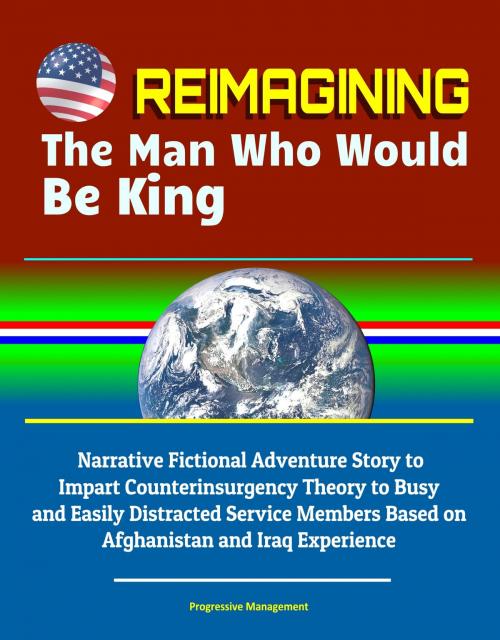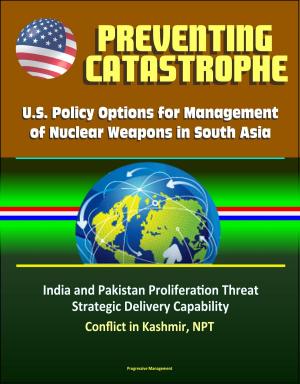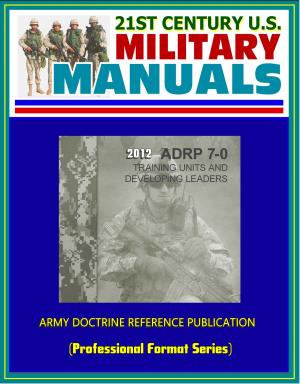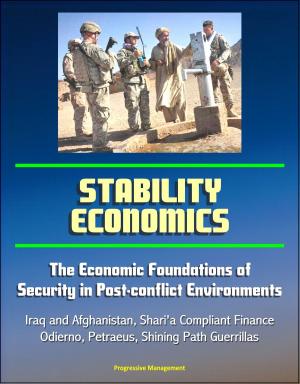Reimagining The Man Who Would Be King: Narrative Fictional Adventure Story to Impart Counterinsurgency Theory to Busy and Easily Distracted Service Members Based on Afghanistan and Iraq Experience
Nonfiction, History, Military, Social & Cultural Studies, Political Science| Author: | Progressive Management | ISBN: | 9780463786178 |
| Publisher: | Progressive Management | Publication: | June 20, 2018 |
| Imprint: | Smashwords Edition | Language: | English |
| Author: | Progressive Management |
| ISBN: | 9780463786178 |
| Publisher: | Progressive Management |
| Publication: | June 20, 2018 |
| Imprint: | Smashwords Edition |
| Language: | English |
This interesting December 2017 report has been professionally converted for accurate flowing-text e-book format reproduction.
In 1888, Rudyard Kipling published The Man Who Would Be King while living in Allahabad in British India. The short story follows two former soldiers on their quest to become kings of Kafiristan, or modern-day Nuristan in Afghanistan. The story was turned into a movie in 1975 starring Sean Connery and Michael Caine and is used at the Naval Postgraduate School as a teaching tool in the Department of Defense Analysis Military Advisor course. How can counterinsurgency theory and hard-won lessons learned from the recent battlefields in Iraq and Afghanistan be better captured and then conveyed in a narrative format that will appeal to a wide spectrum of military personnel—from the most junior enlisted to senior officers? This thesis reimagines Kipling's The Man Who Would Be King and sets it in the near future to test the premise that a fictional adventure story might effectively impart counterinsurgency theory and military advising best practices to otherwise busy and easily distracted service members.
In 1888, Rudyard Kipling published The Man Who Would Be King while living in Allahabad in British India. The short story follows two former soldiers on their quest to become kings of Kafiristan, or modern-day Nuristan in Afghanistan. The story was turned into a movie in 1975 starring Sean Connery and Michael Caine and is used at the Naval Postgraduate School as a teaching tool in the Department of Defense Analysis Military Advisor course. Over two hours and nine minutes, the film raises challenges that are still relevant to advising foreign militaries.
Movies solve a fundamental problem for many service members who are faced with too many books and too little time to read. Volumes about counterinsurgency theory continue to pile up, and mastery of the subject requires years of study, a luxury not afforded to most soldiers, Marines, or special operators in the throes of serial deployments. Worse, despite continuous fighting in Afghanistan for over sixteen years and counting, the U.S. military has managed to continue to misunderstand and misapply the fundamental principles of counterinsurgency.
Historically, the U.S. military has a habit of forgetting counterinsurgency doctrine whenever it is between wars. From World War II to Korea to Vietnam to Iraq and Afghanistan, lessons have been systematically ignored or forgotten in the interwar years, leaving soldiers to have to relearn them on the ground. Ben Malcom highlights this frustration in his book White Tigers, when recounting and reflecting on his time as an advisor of North Korean partisans in 1952. He writes that, although unconventional warfare played a significant role in Allied strategy in World War II, "that knowledge was discarded or ignored after the war, so we came to Korea with virtually no institutional foundation for conducting such operations." Excepting Special Forces, the same could be said for the U.S. Army in Afghanistan and Iraq. Given this trend, it is reasonable to assume that unless lessons can be better captured in a compelling format that will span generations, the U.S. military will similarly stumble in future conflicts.
This interesting December 2017 report has been professionally converted for accurate flowing-text e-book format reproduction.
In 1888, Rudyard Kipling published The Man Who Would Be King while living in Allahabad in British India. The short story follows two former soldiers on their quest to become kings of Kafiristan, or modern-day Nuristan in Afghanistan. The story was turned into a movie in 1975 starring Sean Connery and Michael Caine and is used at the Naval Postgraduate School as a teaching tool in the Department of Defense Analysis Military Advisor course. How can counterinsurgency theory and hard-won lessons learned from the recent battlefields in Iraq and Afghanistan be better captured and then conveyed in a narrative format that will appeal to a wide spectrum of military personnel—from the most junior enlisted to senior officers? This thesis reimagines Kipling's The Man Who Would Be King and sets it in the near future to test the premise that a fictional adventure story might effectively impart counterinsurgency theory and military advising best practices to otherwise busy and easily distracted service members.
In 1888, Rudyard Kipling published The Man Who Would Be King while living in Allahabad in British India. The short story follows two former soldiers on their quest to become kings of Kafiristan, or modern-day Nuristan in Afghanistan. The story was turned into a movie in 1975 starring Sean Connery and Michael Caine and is used at the Naval Postgraduate School as a teaching tool in the Department of Defense Analysis Military Advisor course. Over two hours and nine minutes, the film raises challenges that are still relevant to advising foreign militaries.
Movies solve a fundamental problem for many service members who are faced with too many books and too little time to read. Volumes about counterinsurgency theory continue to pile up, and mastery of the subject requires years of study, a luxury not afforded to most soldiers, Marines, or special operators in the throes of serial deployments. Worse, despite continuous fighting in Afghanistan for over sixteen years and counting, the U.S. military has managed to continue to misunderstand and misapply the fundamental principles of counterinsurgency.
Historically, the U.S. military has a habit of forgetting counterinsurgency doctrine whenever it is between wars. From World War II to Korea to Vietnam to Iraq and Afghanistan, lessons have been systematically ignored or forgotten in the interwar years, leaving soldiers to have to relearn them on the ground. Ben Malcom highlights this frustration in his book White Tigers, when recounting and reflecting on his time as an advisor of North Korean partisans in 1952. He writes that, although unconventional warfare played a significant role in Allied strategy in World War II, "that knowledge was discarded or ignored after the war, so we came to Korea with virtually no institutional foundation for conducting such operations." Excepting Special Forces, the same could be said for the U.S. Army in Afghanistan and Iraq. Given this trend, it is reasonable to assume that unless lessons can be better captured in a compelling format that will span generations, the U.S. military will similarly stumble in future conflicts.















